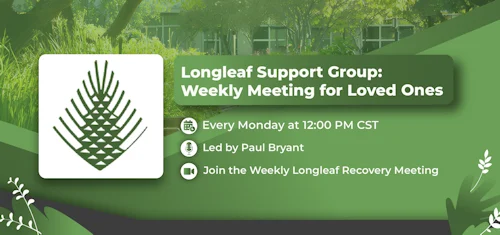Bipolar disorder affects approximately 2.8% of adults in the United States, according to the National Institute of Mental Health. This condition involves significant shifts in mood, energy, and activity levels that can make daily life challenging. At Longleaf Recovery & Wellness, we understand that finding the right treatment approach is essential for managing bipolar disorder effectively. Our comprehensive care programs combine evidence-based therapies with comprehensive mental health treatment to support long-term recovery and wellness.
Living with bipolar disorder or supporting someone who does can feel overwhelming at times. However, with proper treatment and support, many people with bipolar disorder lead fulfilling, productive lives.
According to recent data from the National Alliance on Mental Illness, bipolar disorder typically develops in late adolescence or early adulthood, with the average age of onset being 25 years. However, some people experience symptoms during childhood, while others may not develop symptoms until later in life.
There are several types of bipolar disorder, each with distinct patterns of symptoms:
- Bipolar I Disorder: Defined by manic episodes that last at least 7 days or are severe enough to require immediate hospital care. Depressive episodes typically occur as well, often lasting at least 2 weeks.
- Bipolar II Disorder: Characterized by a pattern of depressive episodes and hypomanic episodes (less severe than full mania).
- Cyclothymic Disorder: Involves periods of hypomanic and depressive symptoms lasting for at least 2 years, but the symptoms don’t meet the criteria for a hypomanic or depressive episode.
- Other Specified Bipolar Disorder: When symptoms don’t match the three categories above but still involve abnormal mood elevation.
Signs and Symptoms That Indicate Professional Treatment Is Needed
– Feeling unusually “high,” euphoric, or irritable for extended periods
– Having abundant energy despite little sleep
– Speaking rapidly about many different things (racing thoughts)
– Engaging in risky behaviors like excessive spending or dangerous activities
– Feeling unusually important, talented, or powerful
– Persistent feelings of sadness, emptiness, or hopelessness
– Loss of interest in activities once enjoyed
– Significant changes in appetite and sleep patterns
– Difficulty concentrating or making decisions
– Thoughts of death or suicide
– Expressing thoughts of harming oneself or others
– Experiencing hallucinations or delusions
– Inability to care for basic needs like eating or personal hygiene
– Severe impairment in work or social functioning
– Psychotic symptoms that cause a disconnect from reality
The impact of untreated bipolar disorder extends beyond mood symptoms. Relationships may become strained during mood episodes, as communication can be difficult and behavior unpredictable. Work performance often suffers due to inconsistent energy levels, concentration problems, and missed days. Even basic self-care routines like regular meals, sleep, and exercise can become disrupted during mood episodes.

Comprehensive Treatment Approaches for Bipolar Disorder
Medication often forms the foundation of bipolar disorder treatment. Several types of medications have proven effective:
- Mood stabilizers: These medications help control the extreme highs and lows of bipolar disorder. Lithium, one of the most widely used mood stabilizers, has been shown to reduce suicide risk by 80% in people with bipolar disorder, according to the National Institute of Mental Health.
- Antipsychotics: Sometimes used to manage symptoms like hallucinations or delusions during severe episodes. They can also help with extreme mood elevation.
- Antidepressants: May be prescribed cautiously and usually alongside mood stabilizers to treat depressive episodes.
Consistency with medication is crucial for effectiveness. At Longleaf, we work closely with each person to find the right medication combination with manageable side effects. Regular check-ins allow us to monitor progress and provide medication management services as needed.
Psychotherapy plays a vital role in bipolar disorder treatment, providing tools to manage symptoms and cope with the condition’s impact:
- Cognitive-behavioral therapy (CBT): Helps identify negative thought patterns and develop healthier ways of responding to challenging situations. Cognitive Behavioral Therapy (CBT) has been shown to reduce relapse rates by up to 50% when combined with medication.
- Interpersonal and social rhythm therapy (IPSRT): Focuses on stabilizing daily routines and improving relationships, which can help regulate mood.
- Family-focused therapy: Involves family members in treatment, improving communication and problem-solving skills while reducing household stress.
- Dialectical behavior therapy (DBT): Teaches skills for managing intense emotions and improving relationships.
Many people with bipolar disorder also experience other mental health or substance use conditions. According to SAMHSA, about 30% of people with bipolar disorder also have a substance use disorder. This is called dual diagnosis or co-occurring disorders.
Common co-occurring conditions include:
– Anxiety disorders
– Attention-deficit/hyperactivity disorder (ADHD)
– Substance use disorders
– Post-traumatic stress disorder (PTSD)
At Longleaf, we address all conditions simultaneously through integrated treatment. This approach recognizes how each condition affects the others and provides comprehensive care that treats the whole person, not just individual symptoms.

Holistic Approaches for Sustainable Recovery
The connection between diet and mental health has gained increasing attention in recent research. Certain nutritional approaches may help stabilize mood:
- Foods rich in omega-3 fatty acids (like salmon and walnuts)
- Complex carbohydrates that release energy slowly (whole grains, beans)
- Fruits and vegetables high in antioxidants
- Adequate protein to support neurotransmitter production
- Limited caffeine and sugar, which can disrupt sleep and energy levels
Regular physical activity has also shown benefits for mood regulation. Exercise releases endorphins, natural mood elevators, and can help establish healthy sleep patterns. Even moderate activities like walking for 30 minutes several times a week can make a difference in managing bipolar symptoms.
Stress often triggers or worsens bipolar episodes. Learning to manage stress effectively can help prevent relapse:
- Mindfulness meditation: Focuses attention on the present moment without judgment, creating space between thoughts and reactions.
- Deep breathing exercises: Activate the body’s relaxation response, reducing the physical effects of stress.
- Progressive muscle relaxation: Reduces physical tension that accompanies anxiety.
- Yoga and tai chi: Combine gentle movement with breath awareness to promote calm.
These practices don’t replace medication or therapy but can enhance their effectiveness. At Longleaf, we incorporate these techniques into treatment programs, teaching skills that can be continued after formal treatment ends.
Creative expression offers valuable outlets for processing emotions and experiences:
- Art therapy: Uses drawing, painting, or sculpting to express feelings that might be difficult to put into words.
- Music therapy: Involves listening to, creating, or responding to music to address emotional needs.
- Nature-based therapy: Utilizes outdoor experiences to reduce stress and increase mindfulness.
- Equine therapy: Interactions with horses can help develop emotional awareness and relationship skills.
These approaches can be particularly helpful during times when verbal expression feels challenging or when traditional therapy has reached a plateau.
Comparing Inpatient and Outpatient Treatment Options in Alabama
| Program Type | Level of Support | Time Commitment | Best For | Typical Duration |
|---|---|---|---|---|
| Residential Inpatient | 24/7 care | Full-time, live-in | Severe symptoms, crisis stabilization | Several weeks to months |
| Partial Hospitalization (PHP) | High support | 5–6 hours/day, 5 days/week | Transition from inpatient; moderate symptoms | Weeks to a few months |
| Intensive Outpatient (IOP) | Moderate support | 3 hours/day, 3–5 days/week | Step-down care; stable but needing structure | Several weeks to months |
| Standard Outpatient | Low support | 1–3 hours/week | Stable individuals; ongoing maintenance | Varies; long-term option |
Residential inpatient programs provide the highest level of support, with round-the-clock monitoring and daily therapeutic activities. These programs typically include individual therapy, group sessions, medication management, and holistic services. Inpatient care is often recommended during acute episodes or when safety is a concern.
Partial hospitalization and intensive outpatient programs offer structured treatment while allowing participants to return home in the evenings or on weekends. This balance supports the practice of new skills in real-world settings while maintaining substantial clinical support.
Standard outpatient care involves regular appointments with a psychiatrist and therapist while living at home and potentially working or attending school. This level works well for maintenance after more intensive treatment or for those with milder symptoms.
Lifestyle Modifications That Support Treatment Success
Sleep disturbances often trigger or worsen bipolar episodes. Consistent sleep habits help stabilize mood:
- Maintain regular sleep and wake times, even on weekends
- Create a calming bedtime routine
- Keep the bedroom dark, quiet, and cool
- Limit screen time before bed
- Avoid caffeine and large meals in the evening
Changes in sleep patterns often signal an oncoming mood episode. Many people notice they need less sleep before a manic episode or sleep excessively before or during depression. Monitoring sleep can help identify early warning signs and prompt intervention.
Strong social support contributes significantly to successful bipolar disorder management:
- Educate close friends and family about bipolar disorder
- Identify specific ways loved ones can help during different mood states
- Join support groups to connect with others who understand the experience
- Establish clear communication about needs and boundaries
- Consider family therapy to improve understanding and support
At Longleaf, we recognize the importance of family involvement in recovery. We offer education and support for loved ones to help them understand bipolar disorder and develop effective ways to provide support.
A well-crafted relapse prevention plan serves as a roadmap for maintaining stability:
- Identify personal triggers (stress, sleep changes, relationship conflicts)
- Recognize early warning signs of mood episodes
- List specific coping strategies for different situations
- Include emergency contacts and when to use them
- Outline medication adherence strategies
These plans are most effective when developed collaboratively with treatment providers and reviewed regularly to reflect changing circumstances and needs.

Taking the First Step Toward Recovery at Longleaf
At Longleaf Recovery & Wellness, we offer comprehensive care that addresses all aspects of bipolar disorder. Our approach combines evidence-based treatments with holistic methods to support lasting recovery. We understand that each person’s experience with bipolar disorder is unique, and we tailor treatment plans to individual needs and goals.
The recovery process begins with a thorough assessment to understand symptoms, history, and treatment goals. From there, we work collaboratively to develop a personalized treatment plan that may include medication management, various therapeutic approaches, and holistic services.
Insurances We Accept








Frequently Asked Questions About Bipolar Disorder Treatment
Medication is effective for many people with bipolar disorder, with studies showing that appropriate medication can reduce relapse rates by 30-40%. Finding the right medication and dosage often requires time and adjustment.
Foods rich in omega-3 fatty acids (like salmon and flaxseeds), complex carbohydrates (whole grains), and antioxidants (colorful fruits and vegetables) may support mood stability as part of a comprehensive treatment plan.
Bipolar disorder is typically a long-term condition requiring ongoing management. Acute episodes may improve within weeks to months, but maintenance treatment often continues indefinitely to prevent relapse.
While some people manage symptoms with therapy and lifestyle modifications alone, research shows that medication significantly improves outcomes for most people with bipolar disorder, especially for Bipolar I Disorder.
Holistic approaches like mindfulness, nutrition, and exercise can enhance traditional treatment by reducing stress, improving sleep, and providing additional coping strategies that support overall wellness and symptom management.
Alabama offers diverse treatment settings ranging from urban clinical centers to programs with nature-based components, along with specialized providers trained in both traditional and integrative approaches to bipolar disorder care.

Starting Your Recovery Journey
If you or someone you care about is experiencing symptoms of bipolar disorder, reaching out for professional support can make a significant difference. To learn more about our treatment programs or verify your insurance coverage, contact us today!
National Institute of Mental Health. (2022). Bipolar Disorder. https://www.nimh.nih.gov/health/topics/bipolar-disorder
National Alliance on Mental Illness. (2023). Bipolar Disorder. https://www.nami.org/About-Mental-Illness/Mental-Health-Conditions/Bipolar-Disorder








